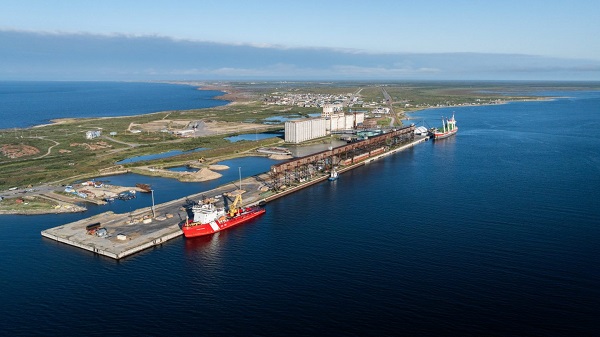Alberta
Alberta NDP have their own Just Transition plan – Project Confederation

From Josh Andrus, Executive Director of Project Confederation
Look what we discovered about the “Just Transition”…
You might remember, not so long ago, that federal Natural Resources Minister, Jonathan Wilkinson, announced that the federal Liberal government would soon be rolling out its plan for a “Just Transition.”
This is the “Just Transition” plan that the federal NDP insisted be included in the “confidence and supply agreement” that is currently propping up Justin Trudeau’s minority government.
Then, an internal government memo was made public, suggesting that hundreds of thousands of jobs will be lost in this “transition” – particularly in western Canada.
Project Confederation immediately sprung to action, investigating the proposed policies and launching a petition against the plan, which has now received more than 13,000 signatures.
(If you haven’t signed the petition yet, you can do so here)
As news spread, Alberta Premier Danielle Smith, and Saskatchewan Premier Scott Moe spoke out strongly against the plan.
But one politician was suspiciously quiet – the Alberta NDP leader, Rachel Notley.
We thought Albertans, and Canadians, deserved to know whether someone running to be Premier of Alberta supported the shutting down of Alberta and western Canada’s largest industry.
And so we pushed hard for Rachel Notley to answer the question – does she support the “Just Transition” idea?
But, as time went on, Notley’s silence became more and more deafening.
Eventually, her silence became so deafening that even some in the media began to question whether or not she truly disagreed with the plan.
Hours turned into days, and days turned into weeks – literally!
Two full weeks after Wilkinson’s announcement, Rachel Notley finally broke her silence, calling on Ottawa to “put the brakes on” the “Just Transition”.
But, “put the brakes on” sounded a lot more like “wait until after the Alberta election” than “ditch it entirely” to us.
So we decided to do some more digging.
Well, after some excellent work by our research team, we think we now know why it took so long for Rachel Notley to oppose the “Just Transition.”
It turns out that, rather than just being some federal NDP idea that she’s now distanced her provincial party from, the “Just Transition” was actually a huge part of her NDP government’s plans.
Insert flashback music here.
It’s November 2015, the newly minted NDP government are celebrating a big election win, and are moving forward with their climate change strategy.
(You know, the one they accidentally forgot to mention that they were going to implement if they won).
New Alberta Minister of Environment and Parks, Shannon Phillips, commissions a blue-ribbon report by a team of high-profile academics, to help the NDP figure out exactly how to fulfil their campaign promise (sorry, their campaign omission).
Several months later, the “Climate Leadership Report” is released, setting out the government’s vision for climate policy and – guess what?
The “Just Transition” is a key part of the NDP’s Climate Leadership Report!
Yep, that’s right – forget not knowing what the “Just Transition” is, and claiming not to support the federal government’s plan.
In reality, it was Rachel Notley’s government who wrote the policy in the first place, and then made it a critical part of their entire environmental policy agenda.
Here are some extracts from the report…
In a section discussing mitigating the impacts of carbon pricing on low- and middle-income Albertans, the NDP said they would “support a sound and just transition for labour and communities…”

Later in the report, the authors highlight a quote from their friends at the Alberta Federation of Labour.
This quote is really just one gigantic contradiction, given the government is literally legislating their employment out of existence:

Next, the report talks about what the workers who lose their jobs might need to do as part of this “transition” – it notes that they may need assistance with “relocation”:

Oh, sorry, did the government legislate away your job?
Not to worry, we’ll “fix” it for you by helping you walk away from your entire life and move somewhere else.
Remember how Rachel Notley said Albertans might have to move to BC to find work while she was Premier?
Yeah, we’d prefer Albertans could find work here in Alberta, thanks.
*****
Here’s the thing…
Not only did the Alberta NDP support the concept of a federal “Just Transition” when they were in government, they were also actively implementing their own “Just Transition” – 8 years earlier than the federal government!
And yet now they claim to not support the idea at all?
No wonder it took so long for Rachel Notley to answer the question.
She was probably just surprised that no one in the media had dug up her own support of “Just Transition” legislation from years before, and was wondering if she could get away with pretending she hadn’t.
Well, we’re not surprised no one in the media bothered looking.
But, we did look, and thank goodness we did!
Thank you to our researchers who dug up this document, which I’m sure the NDP would have preferred we’d not found.
If you’d like to help us do even more research like this, please click here to make a donation to our work.
Otherwise, if you haven’t signed the No Unjust Transition petition yet, please click here to do so now.
Rachel Notley’s claim to now be opposed to the exact thing that she herself implemented is not credible.
She can run from it, but she can’t hide.
Her environmental policies put Alberta into one of its deepest recessions ever.
And we can’t afford to repeat those mistakes.
Sincerely,
Josh Andrus
Executive Director
Project Confederation
Alberta
World’s first direct air capture test centre to open doors in Innisfail

From the Canadian Energy Centre
Deep Sky Alpha facility will trial technologies that suck CO2 from the sky
Innisfail, Alta. is set to host the world’s first test centre for technology that removes carbon dioxide directly from the air to fight climate change.
This June, Montreal-based Deep Sky completed construction of a $110-million carbon removal innovation and commercialization centre in the town about 120 kilometres north of Calgary.
It is a key piece of the company’s vision to build 100 large-scale facilities across Canada and become a pioneer in the emerging market for direct air capture (DAC) technology.
“As of this summer, we will begin not only carbon removal, which is actually sucking it out of the air through these very powerful fans, but also liquefying it and then putting it underground for storage,” Deep Sky CEO Alex Petre told CTV News.
Work began in August 2024 on the project known as Deep Sky Alpha, which aims to begin testing up to 10 different DAC technologies in real-world conditions. It is expected to be up and running this August.
The Government of Alberta is investing $5 million in the facility through Emissions Reduction Alberta.
Deep Sky’s facility will capture up to 3,000 tons of CO2 per year over the next 10 years, with room for future expansion.
Captured CO2 will be transported by tanker trucks about 200 kilometres north to Sturgeon County where it will be injected more than two kilometres below the surface into the Meadowbrook Carbon Storage Hub.
Operated by Bison Low Carbon Ventures, the project is the first approved under Alberta’s open-access carbon sequestration hub initiative and is expected to begin operations before year-end.
“We’re going to line up these eight units side by side and run them to see how they operate in the summer and in the cold of winter,” said Damien Steel, former Deep Sky CEO who continues to serve as a company advisor.
“We’ll be tracking everything to see how all these best-in-class technologies compare – what are their strengths and weaknesses – so that ultimately we can choose the best solutions to scale up for the major commercialization of carbon removal projects that are needed.”
Unlike typical carbon capture and storage (CCS) projects that scrub CO2 from the exhaust of heavy industrial facilities such as power plants, refineries, cement plants or steel mills, DAC utilizes different technology to remove much lower concentrations of CO2 directly from the atmosphere.
According to the International Energy Agency (IEA), there are 27 DAC plants operating worldwide, capturing almost 10,000 tonnes of CO2 per year. In order to reach net zero emissions by 2050, the IEA estimates DAC capacity must expand to more than 60 million tonnes per year by 2030.
Deep Sky selected Alberta for its test facility because of the province’s experience with CCS, including its advanced regulatory system for CO2 sequestration.
“To be successful at carbon removal you need three things: you need access to geologic storage, you need talent, and you need a reliable supply of renewable power to operate DAC facilities. Canada is blessed with these things, and Alberta especially has all of these attributes in spades,” Steel said.
Deep Sky Alpha is one of several clean tech projects underway in a five-acre industrial park in Innisfail as part of an economic diversification plan that was launched in 2022 to make the town a centre for energy innovation.
A municipal solar farm and a power plant that burns garbage and will be equipped with CCS to eliminate emissions are also under development.
Deep Sky says that more than 110 jobs were created during the construction phase of its Innisfail project and it will employ 15 people for annual operations.
Subsequent commercial plants it hopes to build across Canada will employ approximately 1,000 workers for construction and 150 for annual operations.
Steel said he expects the DAC test facility will become a destination for those looking to advance CCS projects around the world, showcasing Canadian expertise in the process.
“My hope is that not only will we learn and improve carbon removal technology, but we will also put Canada on the map in terms of being a place where innovation can thrive and this industry can work,” he said.
“It will be a place where corporate leaders, government officials and customers from around the world can come and see what direct air capture really is, how it works, and how Canada is the place to do it.”
Alberta
Alberta’s savings trust fund jumps by $2.8 billion, hitting a record high of $30 billion.

Alberta’s Heritage Fund reaches new heights
Alberta is growing the Heritage Fund for what matters most – saving for the future to ensure a strong health care system, quality education and the lowest tax environment in Canada. By investing in the Heritage Fund, by 2050 Alberta will be on the path to energize its economy, create new opportunities and fund projects that make life better for all Albertans.
This $2.8-billion contribution marks a new record for the fund and keeps the province on track to reach its goal of $250 billion by 2050. The goal is to grow the fund to the point where, after 2050, Alberta would be able to withdraw some of the income the fund earns each year while still allowing it to grow over time. Those withdrawals could help cover fluctuations in resource revenue, invest in important infrastructure and keep taxes low.
“Alberta is turning resource strength into lasting financial security. By growing the Heritage Fund, we’re strengthening core services like health care and education, while preserving the low-tax Alberta advantage. This $2.8-billion boost to the Heritage Fund is a bold step that sets the province on the path to success and puts Albertans first.”
“This investment is a key step in securing a prosperous future with stable revenues and competitive taxes for Albertans today and tomorrow.”
Alberta’s government recently launched their plan, Renewing the Alberta Heritage Savings Trust Fund: A Roadmap to Securing Alberta’s Future. This plan outlines how Alberta will grow the Heritage Fund to $250 billion by 2050 through strategic investments, global partnerships and strong governance, securing long-term economic growth and stability. These strategic investments will eventually fund the public services and infrastructure vital to supporting the growing province.
Central to the plan is the leadership of the Heritage Fund Opportunities Corporation. The updated corporation will modernize the fund’s management and help Alberta access global investment opportunities to create meaningful wealth and future prosperity. Led by board chair Joe Lougheed, the corporation will strengthen the governance of Heritage Fund assets and support investment decisions independent from government.
“Our role is to ensure the Heritage Fund is managed with the highest standards of governance and independence. By embracing global opportunities and modernizing oversight, we’re safeguarding Alberta’s wealth to deliver steady, long-term prosperity for Alberta’s future generations.”
This historic boost to Alberta’s Heritage Fund isn’t just about the numbers – it’s about building a future where families thrive, communities grow and Alberta stays strong no matter what comes next.
Quick facts:
- Alberta’s government invested $2.8 billion from the 2024-25 surplus cash in the Heritage Fund, growing the fund to $30 billion from $27.2 billion in 2024-25.
- This is up from $22.9 billion in 2023-24, the previous fiscal year.
- Alberta’s goal is to grow the fund to $250 billion by 2050.
- Once $250 billion is reached, interest from the fund will help stabilize resource revenue, invest in infrastructure and keep taxes low.
- Since 2019-20, the Heritage Fund has grown more than 84 per cent:
- from $16.3 billion to $30 billion.
- Since 2022-23, the Heritage Fund has grown more than 41.5 per cent:
- from $21.2 billion to $30 billion.
- The board of the Heritage Fund Opportunities Corporation brings together the skills and expertise of Alberta and international leaders in investment management to set Alberta up for long-term success. The current members are:
- Joe Lougheed, board chair, Alberta
- Kate White, director, Alberta
- Jacqueline Curzon, director, Switzerland
- Jouko Karvinen, director, Finland
- Chana Martineau, director, Alberta
- Mary Ritchie, director, Alberta
Related information
-

 Education1 day ago
Education1 day agoWhy more parents are turning to Christian schools
-

 Alberta1 day ago
Alberta1 day agoUpgrades at Port of Churchill spark ambitions for nation-building Arctic exports
-

 Alberta1 day ago
Alberta1 day agoOPEC+ is playing a dangerous game with oil
-

 Business1 day ago
Business1 day agoIs dirty Chinese money undermining Canada’s Arctic?
-

 National2 days ago
National2 days agoLiberals push to lower voting age to 16 in federal elections
-

 COVID-191 day ago
COVID-191 day agoJapan disposes $1.6 billion worth of COVID drugs nobody used
-

 conflict1 day ago
conflict1 day agoOne of the world’s oldest Christian Communities is dying in Syria. Will the West stay silent?
-

 COVID-191 day ago
COVID-191 day agoWATCH: Big Pharma scientist admits COVID shot not ‘safe and effective’ to O’Keefe journalist






